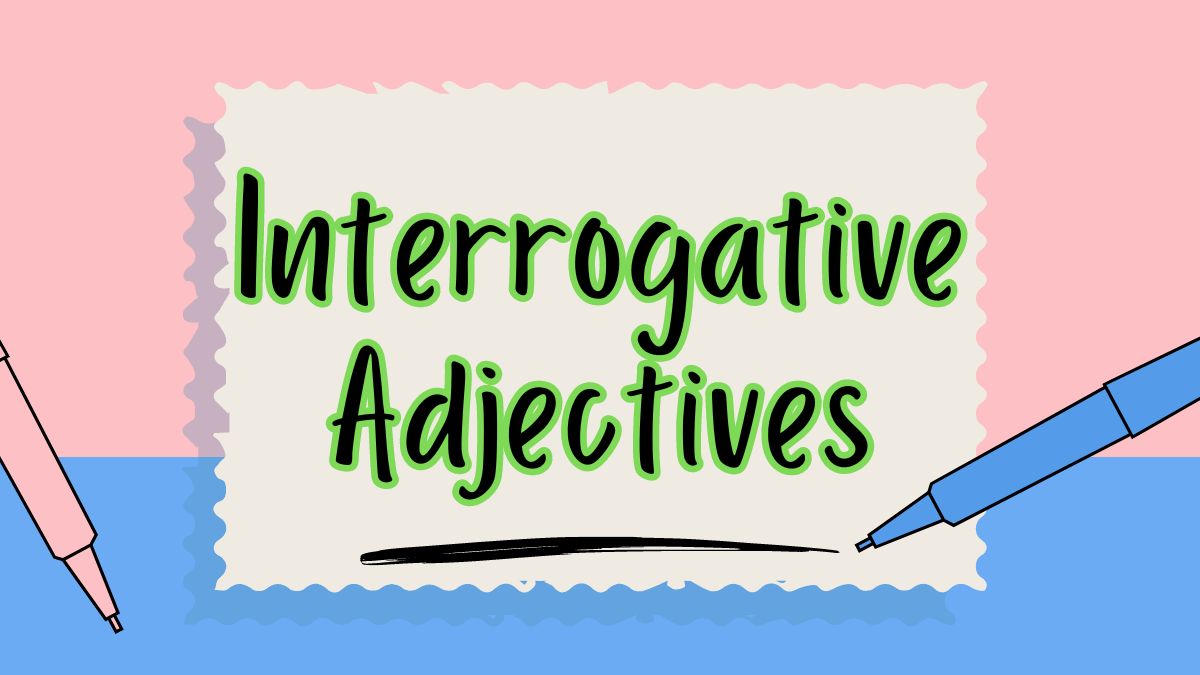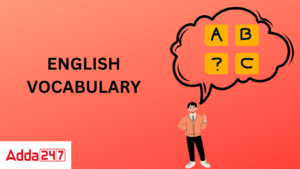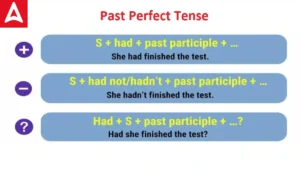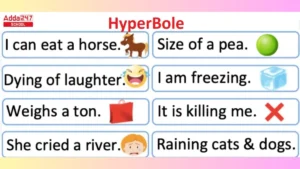You must have been using adjectives from many years but you must have not know about its various types. One such type of adjectives that we are going to discuss in this post is: Interrogative adjectives. When you hear the word interrogative, the sentences which ask questions will come to you mind.
But do you know that the interrogative words can be used in the form of an adjective too, that help modify or define the characteristics of a noun or pronoun. Let us learn about this adjective type in detail.
Interrogative Adjectives
Most likely, you are familiar with the definition of “interrogative.” The act of asking someone or about something in order to get information is referred to as “interrogation” or “interrogative.” An Interrogative adjective is also based around the nature of interrogation. Gaining knowledge of interrogative adjectives can significantly improve your ability to communicate, encourages you to ask questions, and involves you in important discussions.
What is an Interrogative Adjective?
An interrogative adjective, such as ‘whose’, ‘what’, and ‘which’, is used to ask questions and modify a noun or pronoun. An interrogative adjective is a wh-type question phrase that is used to delve into any given sentence segment. It’s a phrase that changes a noun just by posing a question.
Nonetheless, because they are used to determine a phrase in order to pose a question or conduct further investigation, they are referred to as interrogative determiners. Similar to which, whose, and what, an interrogative adjective modifies a noun or pronoun by posing a question. In English, the interrogative adjectives are What, Which, and Whose.
Interrogative Adjectives Definition
An interrogative determiner, also known as interrogative adjective, is a word that changes a noun by posing a question. The question words in English Grammar are ‘what’, ‘which’, and ‘whose’. These words function as an interrogative adjective in a sentence.
Question adjectives are another name for interrogative adjectives. It is crucial for obtaining precise data regarding nouns or pronouns. An adjective that changes a noun into a question is known as an interrogative adjective. Usually used to pose questions, this is followed by a word or pronoun. These adjectives have little or no meaning on their own; they are only used to elicit questions.
Examples of Interrogative Adjectives
English has only three interrogative adjectives: Which, What and Whose. Let’s examine some instances of how each can modify the noun in sentences.
- Whose picture is that?
- Whose book is that?
- Did you find out whose keys those were?
- Which game would you like to play?
- Which dinner would you like to have?
- Which number is greater than five?
- Which is your house?
- What is your father’s name?
- What kind of games do you like most?
- What color is the rainbow?
- What was your question?
Difference Between Interrogative Adjectives and Interrogative Pronouns
Because of their differences in structure, interrogative adjective and interrogative pronouns are often confused. Interrogative adjective and pronouns both aim to get information and have a similar appearance, leading to confusion. Let’s examine the table to see the distinctions between interrogative adjectives and interrogative pronouns.
| Interrogative Adjective | Interrogative Pronoun |
| Adjectives that change a noun by posing a query are known as interrogative adjectives. | In contrast, a noun in a question can be replaced or substituted with an interrogative pronoun. |
| An interrogative adjective is typically followed by a noun. | An interrogative pronoun is followed by a verb, in contrast to interrogative adjective. |
| What, whose, and which are a few instances of interrogative adjective. | The interrogative pronouns who, whom, whose, what, and which are a few examples. |
|
|
Importance of Interrogative Adjectives
It is essential to have the ability to ask questions in practically every speech. Visit the websites devoted to simple inquiries and interrogative phrases for further details on how to formulate queries. When using interrogative adjectives, proficient English writers make fewer mistakes in their work. Mixing up who and whose while using interrogative adjectives is the most common error.
Interrogative Adjectives and Determiners
The many categories of adjectives are frequently less defined than those of nouns and verbs. For instance, interrogative adjective may be referred to as interrogative determiners or simply interrogatives since many style guides and grammar advice sources view them as a class of terms known as determiners.
The interrogative adjectives which, what, and whose, in contrast to many others, can also be employed as pronouns, as in What is this? Furthermore, using any of these terms as superlative or comparative adjectives is grammatically incorrect; an object might be faster than another, but it cannot be “what-er” than another object.
Although these characteristics could lead one to categorize interrogative adjective as a distinct figure of speech, when what, which, and whose are used to modify nouns and pronouns, we see them as adjectives. However, not all style guides will follow this methodology, so don’t be shocked if you encounter these terms mentioned without regard to their adjective classification.
How to Use Interrogative Adjectives
Regarding interrogative adjectives, there are a few factors to be aware of.
What, which, and whose are neither comparative or superlative adjectives, as was previously stated. To refer to something as “whicher” or “the most whose” is absurd.
When employed as interrogative adjectives, the adjectives which and what have quite different meanings. When posing an open-ended inquiry or when there are no specified options, we usually use the term what. However, when there are explicit or implicit choices, we usually use the word which. As an illustration:
- There are five houses on this street. Which house is yours? (The questioner has restricted the responses to one of five houses)
- What school did you go to? (The questioner is not restricting the options; any school could be the response)
Interrogative Adjectives Exercise
Determine whether the highlighted words in the sentences are interrogative adjectives or interrogative pronouns.
- Can you tell me whom I should contact?
- Who was in that room?
- What would you like to have for dinner tomorrow?
- Which of these did you find in the lost and found box?
- Do you know whose vehicle is parked in B2?
Answers
- Can you tell me whom I should contact? – Interrogative pronoun
- Who was in that room? – Interrogative pronoun
- What would you like to have for dinner tomorrow? – Interrogative pronoun
- Which of these did you find in the lost and found box? – Interrogative adjective
- Do you know whose vehicle is parked in B2? – Interrogative adjective
| Related Articles | |
| Relative Pronouns | Common Nouns |
| Transitive and Intransitive Verbs | Possessive Adjectives |
| Adjectives | Compound Adjectives |











 Vocabulary Words with Meaning and Senten...
Vocabulary Words with Meaning and Senten...
 Past Perfect Tense: Definition, Formula,...
Past Perfect Tense: Definition, Formula,...
 Hyperbole- Explanation, Definition, Exam...
Hyperbole- Explanation, Definition, Exam...














